
Main Page
Film Festivals

Ascension is a provocative, fly-on-the-wall glimpse of the Chinese economy today. Director Jessica Kingdon shows footage of workers in lower-end, blue-collar jobs up to workers in high-end jobs. There's no voice-over narration to spoon-feed the audience about what they're seeing or to comment on any of it. She trusts your intelligence, perceptiveness and critical thinking skills to make your own conclusions, much like in a Frederick Wiseman documentary. Imagine the factory scenes in Ron Fricke documentary Samsara, but without the music or time-lapse cinematography and you'll get an idea of what watching Ascension is like. An accurate way to describe it is that it's a thorough, immersive experience of the Chinese economy that lets you, the audience, be the narrator. Whether you're watching workers assembling sex dolls at a factory or a poultry plant or a job recruiting fair, there's always something for you to learn just through the act of observation. Even if you know a little about the Chinese economy beforehand, you'll still have something to take away from it, especially if you compare it to the U.S. economy or other economies. Ascension is also very well-edited and shot, so, like with any great doc, there's just the right balance of style and substance. Kingdon should also be commended for ending the film at a water park because it's unexpected. That, among other editing choices, make for a doc with a few surprises every now and then. Distributed by MTV Documentary Films. 
Cow is an unflinching glimpse of the life of a dairy cow on an English farm. The cow, named Luma, gives birth twice to a calf, produces milk and gets separated from her calves. Director Andrea Arnold uses a fly-on-the-wall approach to showing Luma on the farm. There are no interviews with the farmers, no music score to accompany the images, and no narration or texts to describe what you're seeing. She grasps precisely how powerful images and sound can be. Images are often more powerful than words which is the case with this spellbinding documentary. The sounds are natural which makes the film all the more immersive. The images aren't picturesque or glossed up in any way through editing.
Andrea Arnold makes you feel as though you were there at the farm interacting with Luna, so the audience, in a way, becomes an essential part of the film. You become less aware of the camera and, soon enough, you begin projecting from your own experiences and making your judgements about what you're observing. As you take in the sights and sounds, Luna eventually becomes anthropomorphized. Bravo to Andrea Arnold for trusting the audience's emotions and letting them to emotionally process Cow. There are lots of emotions to process during and after the film as well. At a running time of 1 hour and 37 minutes, Cow is a transcendent, profound experience for those who open their heart, mind and soul to it. IFC Films opens Cow at IFC Center and on VOD on April 8th, 2022. 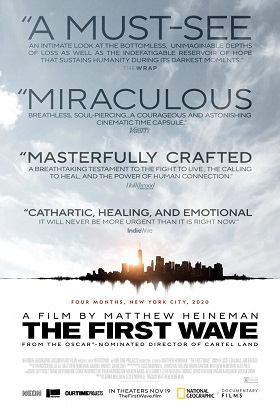
The First Wave hits just as hard emotionally as a war documentary. In a way, it is about war, but the enemy is a silent one: COVID-19. Director Matthew Heineman films the nurses, doctors and COVID patients at Long Island Jewish Medical Center in New York City during the first four months of the pandemic, March 2020 to June 2020. It's unflinching, immersive and emotionally devastating which is precisely what a documentary about such a tragic event ought to be. Heineman deserves to be commended for gaining so much access to his subjects right inside the medical center and for putting a human face to the pandemic. To watch The First Wave while still in the middle of a pandemic isn't an easy experience because it asks the audience to confront painful emotions and memories, but by confronting our painful memories, we're at least on the path toward overcoming that pain. Also, it's important not to forget the past no matter how difficult it might be to confront it on an emotional level. The First Wave looks at the first wave of the pandemic head-on and asks the audience to do that same, so be prepared for a lot of intense moments. Fortunately, the documentary doesn't focus just on despair and suffering; there's also some hope, perseverance and even a little joy. Also, the cinematography looks terrific with some breathtakingly poetic shots of New York City which adds not only style, but also makes the film more cinematic. At a running time of 1 hour and 34 minutes, The First Wave is brave, profoundly moving and unforgettable. It's a powerful, unflinching and vital documentary. The First Wave opens on November 19th, 2021 at Quad Cinema and AMC Empire via National Geographic Documentary Films and NEON. 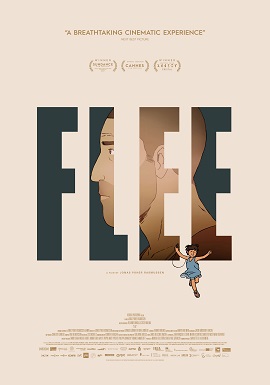
Flee is one of the most moving and cinematic documentaries of the year. Director Jonas Poher Rasmussen interviews a gay man living in Denmark who recalls how he and his family fled Afghanistan in the 1990s when he was a teenager and still in the closet. The man, Amin, whose real name is kept anonymous to protect his identity, has never told his harrowing story except to an ex-lover. He explains in detail the journey that he took and what obstacles he encountered along the way as he ended up separated from his family. He's very brave not only for putting his life at risk by fleeing, but also for talking about those traumatic events so candidly and vividly. Not all of them are traumatic; there are some heartwarming moments, i.e. what happened after Amin came out to his father. Director Jonas Poher Rasmussen puts him at ease from the very beginning by having him lay down and making sure that he's comfortable. Amin's story itself is thrilling, riveting and even terrifying at times, but what's even more potent and emotionally resonant is the emotional journey that he goes through. Flee could've turned into a conventional talking-heads documentary if it weren't for its visual style. Instead, Rasmussen uses animation to show the interview with Amin and the flashbacks to his past. There's some actual documentary footage shown, but it's archival and serves as a reminder that the film you're watching is non-fiction even though it's animated. The animation looks great without going over-the-top in style. What's important, ultimately, are Amin's words, his memories and the feelings that those memories conjure. Prepare yourself for an emotionally gripping rollercoaster ride that's filled with hope, despair, perseverance, thrills, drama and even a little romance. All of those elements could have turned into an uneven, overstuffed mess with a less skilled director. Fortunately, Rasmussen combines it all into a documentary that feels equally captivating and cinematic. Flee is one of the best documentaries and animated films of the year. It's a spellbinding, poignant and heartfelt emotional journey with just the right blend of style and substance. It opens in select theaters on December 3rd, 2021 via NEON. 
Roadrunner: A Film About Anthony Bourdain, directed by Morgan Neville, is a stylishly edited documentary about the life and career of world-renown celebrity chef Anthony Bourdain. When Neville focuses just on Bourdain's work and, eventually, on some of his emotional battles, the doc becomes fascinating, although not very profound, surprising or revealing. The footage of Bourdain as he travels a lot and leaves his family behind shows a lonely, sad man behind the curtain. He worked hard which isn't surprising and was clearly talented, but as a human being he was flawed. While Neville avoids turning the doc into a hagiography, he doesn't quite do a thorough enough job of showing Bourdain as a human being. The focus on Bourdain's suicide toward the end of the film goes on for too long and quickly becomes repetitive. It hits the audience over the head with his death and feels somewhat invasive and exploitative. There are no interviews to be found here with Asia Argento who might've added some insights and definitely would've provided a much-needed and important perspective, especially because they knew each other so well. Whatever Bourdain struggled with before he took his life and what made him commit suicide is a private matter and shouldn't be anyone's business except for those who are close to him. Perhaps only Bourdain himself knows why he did it. Either way, when the doc crosses that boundary, it becomes more of a tabloid than a serious, thoughtful, fair and balanced documentary. At a lengthy running time of 2 hours, Roadrunner: A Film About Anthony Bourdain is mildly engaging, but overlong, incomplete and occasionally exploitative. Distributed by Focus Features. 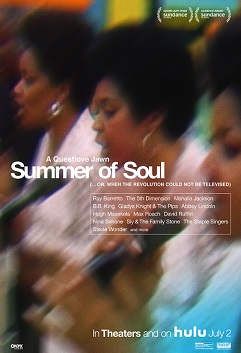
Summer of Soul (...Or, When the Revolution Could Not Be Televised), directed by Ahmir "Questlove" Thompson, is a toe-tapping concert film that shows long-lost footage from The Harlem Cultural Festival that took place in Mount Morris around the same time as Woodstock in 1969. Famous singers like B.B. King, Nina Simone, Stevie Wonder, Gladys Knight and many more performed at the festival which lasted six weeks with six concerts. All of the concerts were free to the public. Interspersed between the captivating concert footage are interviews and photographs which provide the doc with insights about Black history, like the fact that an NY Times journalist, Charlayne Hunter-Gault, convinced her editor to change the word "Negro" to "black" in her article and in future newspaper articles. Although the history lessons that Summer of Soul teaches the audience are valuable and illuminating, the music speaks for itself. Listening to it while watching the musicians perform it with such emotion and passion is a magical, profound and transcendent experience. It's also worth mentioning the film's editing which blends the footage and interviews in a way that entertains the audience while provoking them emotionally as well as intellectually. That's no easy feat to achieve. At a running time of just under 2 hours, Summer of Soul (...Or, When the Revolution Could Not Be Televised) is one of the best music documentaries since Standing in the Shadow of Motown. Distributed by Searchlight Pictures. Now streaming on Hulu.
Julia is a conventional documentary biopic about famous icon Julia Child that nonetheless hits all the right notes: it's enormously entertaining, insightful and even moving at times. There's nothing inherently wrong with a conventional approach as long as it appeals to the heart and mind without becoming dull. Co-directors Julie Cohen and Betsy West do a great job of showing what Julia Child was both as a chef and as a human being. This isn't a hagiographic documentary; it also delves into her struggles and obstacles that she faced in her work life as well as her in personal life while also providing a glimpse of what her personality was like. They begin the doc with succulent, delicious-looking shots of food and there are plenty of clips of Julia cooking on her show after that, so don't watch the film while you're hungry. Combining interviews with her friends and colleagues, photographs from her childhood, and footage from her shows, Julia remains thoroughly captivating and with brisk pacing. It avoids feeling dry or repetitive, but the filmmakers are lucky to have such an interesting, warm and charismatic subject. Even those of you who are familiar with Julia Child will learn something new about her; everyone, though, will see her as a human being by the time the end credits roll and to understand what makes her such an inspirational role model for other chefs as well as her viewers. Although Julia doesn't quite reach the emotional heights of RGB, it's still a captivating, illuminating and well-edited delight that captures Julia Child's warmth, wisdom and humanity. At a running time 1 hour and 35 minutes, Julia opens November 12th, 2021 at Angelika Film Center and AMC Lincoln Square via Sony Pictures Classics. 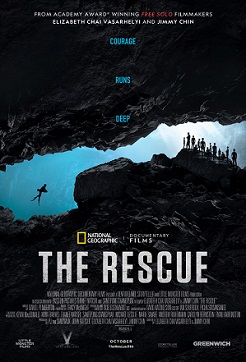
The Rescue is a engrossing and riveting documentary that details the 17-day search for 12 boys from a soccer team and their coach who were trapped inside an underwater cave in Thailand back in 2018. Co-directors Jimmy Chin Elizabeth Chai Vasarhelyi includes interviews with some of the cave divers, namely Vern Unsworth, Rick Stanton and John Volanth. Those brave rescuers, among others, risked their lives as they dived into the deep waters of the cave with limited to zero visibility. The co-directors also show footage of the Thai children from inside the cave as well as underwater footage which makes for an equally thrilling, horrifying and poignant experience. You'll learn the details of how the rescuers had to brave the elements to try to rescue the Thai boys and the setbacks that they experienced along the way. What truly elevates The Rescue, though, is not just that suspenseful footage, but the way that the filmmakers humanize the subjects whom they interview. Even Rick Stanton's girlfriend, Siripon Bugnngern, gets a chance to speak her mind and to explain what it's like being in a relationship with someone who's a cave diver. Standon himself also ponders the question of how his experiences as a cave diver has affected the relationships in his life. That candidness adds plenty of substance to the documentary. It's also worth mentioning how well-edited the film is as it combines the talking head interviews with the footage and even some animated scenes that show the map of the cave to show the rescuers' location and progress to the audience. There's not a dull moment to be found nor does the film become exhausting. Just like a great documentary should be, The Rescue finds just the right balance between entertaining the audience and provoking them emotionally. Man on Wire accomplished that feat, too. At a running time of 1 hour and 47 minutes, it's a powerful, gripping and emotionally resonating experience. Distributed by National Geographic Documentary Films. 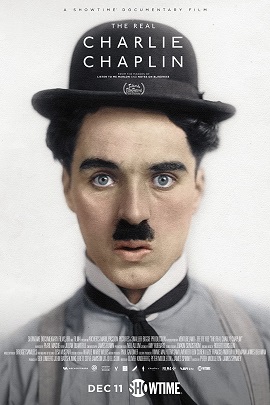
The Real Charlie Chaplin, directed by Peter Middleton and James Spinney, is an illuminating doc about iconic actor/filmmaker Charlie Chaplin. It's not a hagiographical biopic nor is it a thorough look at this life and work. Instead, the filmmakers try to get a sense of what Charlie Chaplin was really like as a human being. Through archival footage and audio interviews with Chaplin, The Real Charlie Chaplin provides the audience with a sense of what his personality was like, his flaws and his struggles. He wasn't a good father and was abusive toward women, many of whom were much younger than him---teenagers, even. Fortunately, the doc doesn't judge him, so it leaves that judgement up to the audience. The narration by Pearl Mackie merely states the facts while guiding the audience through moments from Chaplin's life. It's also worth mentioning that there's no excessive use of clips from Chaplin's films, i.e. The Kid and City Lights, but there's just enough clips used to buttress the film's insights without leading to repetitiveness. The access to some of the footage and audio clips alone are among the film's many strengths. The same can be said for how the editing combines it all in a way that doesn't become dull at any point. If you thought you knew who Chaplin was, think again. There's more to him than meets the eye and he was a complicated, elusive man who probably barely even knew himself and had issues with his own identity. This isn't a psychological study of Chaplin, but it does come close to feeling like one because what's certain, by the time the end credits roll, is that Chaplin was a deeply disturbed human being. That doesn't change the fact that he's a brilliant comedian and hysterically funny, but it does make you wonder how modern day "cancel culture" and social media might've affected his life and career. Perhaps his downfall would have occurred sooner. By the end of the doc, Charlie Chaplin remains icon albeit a very flawed one who's far from likable as a human being, but he's a human being nonetheless. At a running time of 1 hour and 54 minutes, The Real Charlie Chaplin is well-edited, provocative and insightful. It opens at Cinema Village via Showtime Documentary Films on November 19th, 2021 before airing on Showtime on December 11th, 2021. 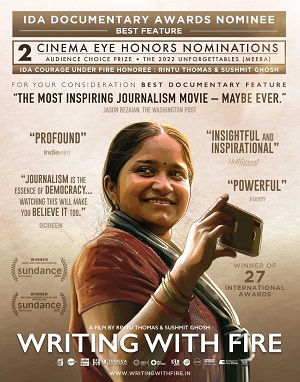
Writing with Fire sheds light on Dalit women from Northern India, Meera Davi, Suneeta Prajapatii and Shyamkali Devi, among others, who started a newspaper called Khabar Lahariya. Dalit, as the doc clearly explains at the very beginning, are women who are treated by society as the lowest caste in India. They're raped and dehumanized in other ways by men in the upper castes while the government ignores their pleas for basic needs like electricity in their villages. Co-directors Rintu Thomas and Sushmit Ghosh do an impeccable job of following the brave Dalit women from the inception of the newspaper to their obstacles along the way. They even started online journalism with video footage to reach more people and make more of an impact. Their perseverance and courage pays off because changes were indeed made after one of their news reports spread like wildfire online. It's inspiring to observe how they managed to conquer adversity and make a difference. Most importantly, they provide a sliver of hope for democracy, truth and justice in a society that oppresses women and suppresses freedom of the press. Naomi Wolf, who wrote about how the government shut down democracy by suppressing the press in The End of America, would be proud of them. The Dalit women clearly grasp that fighting for truth and justice through journalism is fundamentally about fighting for democracy and that it's easier to lose democracy than it is to gain it, so the fight for democracy must always continue. They're brave for risking their lives and should be commended for sharing their story which will hopefully compel others to find the inner strength and awareness to stand up against any form of oppression through the power of journalism. To watch the Dalit women of Khabar Lahariya come together to help each other and to be so compassionate toward others is also inspiring. They're aware that just because they're dehumanized by their society and government, it doesn't mean that they should dehumanize themselves and other people. In other words, they're great role models. The doc remains engaging from start to finish thanks to the compelling story of these women as well as the film's editing style that elevates it beyond just an average, dry documentary with talking heads. There's nothing dry at all about Writing with Fire. Even though the filmmakers focus on Khabar Lahariya, Writing with Fire is not limited in scope because also tackles larger human rights issues like truth, justice and democracy that will resonate with every compassionate human being around the world. After all, it's much easier to lose democracy than it is to gain it. Documentaries like Writing with Fire provide some much-needed fuel for the fight to keep democracy alive. At a running time of 1 hour and 32 minutes, Writing with Fire is an empowering, heartfelt and captivating documentary that's essential viewing for the sake of democracy. It'd be an interesting double feature with What is Democracy?. Music Box Films opens it at Film Forum on November 26th, 2021. 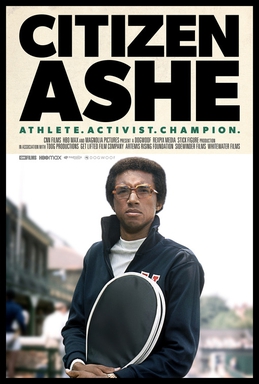
Citizen Ashe is a documentary biopic about Arthur Ashe, the first African American tennis player to win Wimbledon, the Australian Open and the U.S. Open. Co-directors Rex Miller and Sam Pollard combine archival footage and photos of Ashe along with interviews with his wife, Jeanne Moutoussamy-Ashe, his brother, Johnnie, civil rights activists as well as professional tennis players Billie Jean King and John McEnroe. They include the backstory of Ashe's childhood growing up in Richmond, Virginia, but the info isn't presented right at the beginning which makes the doc feel less pedestrian. Ashe was not only a famous tennis player, but also someone who gradually became a civil rights activist and, eventually, spoke out about AIDS which he was diagnosed with later in life. He was very much a humanitarian, although he knew the risks to his career of becoming part of the civil rights movements. Citizen Ashe doesn't have anything particularly revealing to say about Arthur Ashe, but his story is indeed a timely and inspirational one. He makes for a great role model. The filmmakers do the best they can to allow the audience to grasp what kind of a person Ashe was outside of the court to humanize him, but, for the most part, they focus on his humanitarian efforts. You don't have to be a tennis aficionado to be engaged by this doc. There's some footage of his tennis matches, but not too many. It's also worth mentioning the stylish, lively editing by R.A. Fedde, Lewis Rapkin, Federico Rosenzvit, and Ben Sozanski which keeps the film moving at a fast enough pace and helps it to avoid becoming dull. This isn't the kind of doc when you ask at the end, "When's the exam?" or that overstays its welcome. The filmmakers wisely doesn't dwell too much on Arthur Ashe's death from AIDS-related pneumonia It does feel slightly hagiographic and lacking in depth, but at least it remains an engaging and informative introduction to Arthur Ashe for those unfamiliar with him or his activism. At a running time of 1 hour and 93 minutes, Citizen Ashe is a well-edited, inspirational glimpse of Arthur Ashe as a humanitarian activist, a talented, groundbreaking tennis player and a compassionate human being. It opens on December 3rd, 2021 at Quad Cinema via Magnolia Pictures and CNN Films at Quad Cinema. 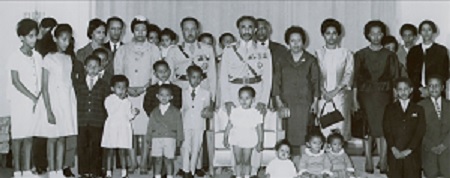
Grandpa Was an Emperor is a captivating, gripping and poignant documentary that investigates the truth behind the coup that ousted Haile Selassie, the former Emperor of Ethiopia in 1974. Director Constance Marks follows Yeshi Kassa, Emperor Haile Selassie's granddaughter, as she tries to uncover what happened to her father and what led to her family members who were sent to prison after the coup. Yeshi's quest for the truth is also a quest for justice and democracy, ultimately, but she has obstacles along the way because of government corruption. The answers to her questions aren't easy for her to find, yet she doesn't give up on her journey. The audience comes with her on that journey and feels like a part of it. When she discovers new information, the audience experiences her excitement about it at the same time. She's very brave for confronting her family's past head-on regardless of how dark it is. You can palpably sense her struggle as she desperately searches for the truth. Grandpa Was an Emperor also serves as an insightful and eye-opening history lesson about Emperor Haile Selassie and about Ethiopian history in general. Emperor Selassie's friendship with Bob Marley is particularly fascinating and even heartwarming. Director Constance Marks does a great job of combining archival footage, photos and interviews in a way that entertains the audience while keeping them engaged on an emotional and intellectual level. That's the ultimate sign of a great documentary, so it's a testament to the filmmaker's strengths as a filmmaker and story-teller that the document achieves such a remarkable feat. |
The NYC Movie Guru
themovieguru101@yahoo.com
Privacy Policy